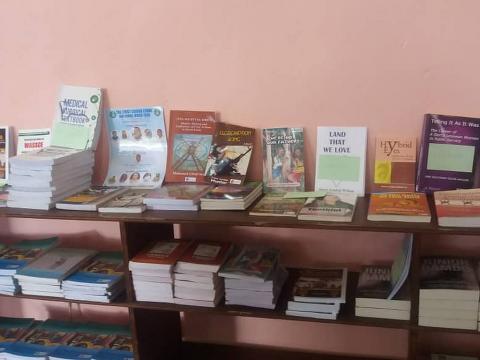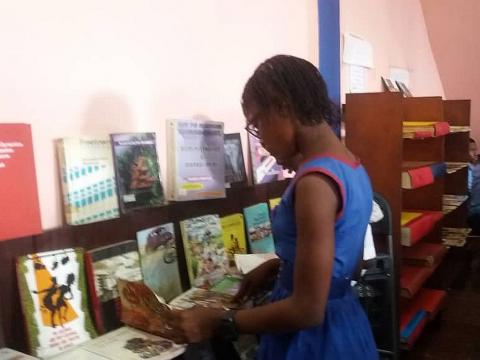By Hajaratu Kalokoh
Statistician General Professor Osman Sankoh has lamented the seriously low rate of reading among children in Sierra Leone, which he says holds a bleak future for the country if action is not taken to bridge the gap.
Prof. Sankoh, the Chief Executive Officer of Statistics Sierra Leone (Stat SL), made the statement during the launch of the first ever National Book Fair in the country, where he said 84% of children in the country couldn’t read a short story, referencing the Multiple Indicator Cluster Survey (MICS) of 2017.
According to the survey, only 16% of children age 7-14 can read 90% of a story well, answer three comprehension questions and two inferential questions.
Only 12% of children age 7-14 can successfully perform a number reading task, a number discrimination task, an addition task and a pattern recognition and completion task, Sankoh added.
The revelations by the Statistician General constitute another damning indictment on the educational system of the country.
“We must do something, Mr Minister, we have a problem,” Sankoh said at the programme which was inaugurated by Minister of Basic and Senior Secondary Education, Dr Moinina David Sengeh.
The Statistician General added: “If these are the children that we look into their eyes and we tell them that they are the leaders of tomorrow and they are not educated and they cannot read…we have got to do something for them.”
The book fair which was launched on Thursday at the Headquarters of the 50/50 Group in Freetown, is an initiative of the Sierra Leone Writers Association (SLWA), an academic and general publisher for Sierra Leoneans and other nationals whose writings have a Sierra Leonean context.
The book fair, which was meant to last for three days, was aimed at restoring the culture of reading among pupils and adults, especially stories with Sierra Leonean perspective.
According to the United Nations Educational Scientific and Cultural Organization (UNESCO), adult literacy in Sierra Leone is 32.43%.
Many children in the country lack strong academic foundation, a situation compounded by untrained and unqualified teachers and lack of monitoring mechanism.
Minister of Basic Education, Dr Sengeh, while officially opening the fair, noted that the problem of low culture of reading among children required a collective responsibility to fix.
“It is important we change our perspective about reading. It is not the fault of the children that they cannot read. We as society have to today draw the line at beating our children because they cannot read, because the reason your child cannot read is because you, is because the teacher, is because the community leader, is because everyone is not doing everything they need to do to ensure that child reads,” Sengeh said
He added: “It is because you have not sat down and understood the child’s capability, their psychosocial development, their cognitive, physical challenges, their health, that’s why your child cannot read as a society. It is not enough for us to blame the children because it is not their fault.”
Isaac Joseph Williams, a teacher at Bethel Hope Academy, blames the problem on the poor teaching techniques of teachers as well as lack of monitoring by parents.
"From the foundation, starting from the nursery area, that is where you begin to equip the child,” he said, noting that the manner in which some teachers do it doesn’t help.
“You must teach the child to identify letters and pronounce it. Then help the child to read on his or her own," he added.
Williams said parents should also take responsibility for the reading ability of their children.
He said: "You the parents need to help the child at home. You send the child to school, the teacher does his or her own effort to help the child. You the parents should also monitor the child’s progress and help the child to be developed."
The government has invested heavily in the Free Quality Education. A component of the program next year will focus on the development of children from pre-primary stages. This year, the Open Society Initiative for West Africa has supported the Government of Sierra Leone to lunch the first set of picture books authored by Sierra Leoneans.
An interesting thing about this book fair is that it encourages reading Sierra Leonean books like those.
Liam Nicols, a pupil of the Sierra Leone Grammar School, spoke about the significance of reading books authored by Sierra Leoneans.
“Reading Sierra Leonean books give you a nice sense of familiarity like you know what’s going on. If you read books that were published by Sierra Leoneans, it is much easier to understand what the book is trying to convey within the Sierra Leonean context,” Nicols told Politico.
Copyright © 2019 Politico Online










